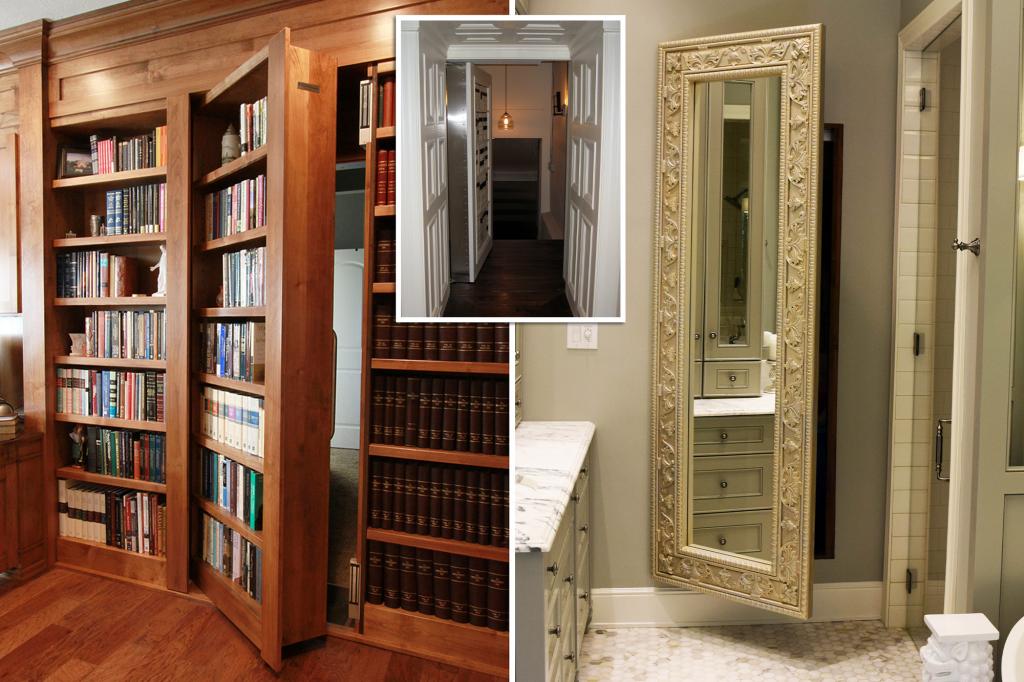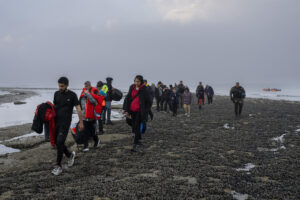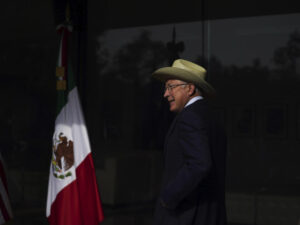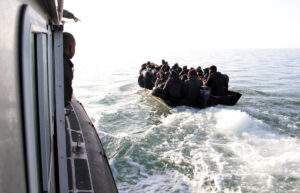New Yorkers are fortifying their homes with panic rooms and bullet-proof doors like never before over fears about crime, migrants and national turmoil — and it’s not just the city’s elite partaking in the trend.
“Not every [customer] is an ultra-rich stockbroker — a lot of them are just people, middle-class kind of people,” said Steve Humble, founder of the home-defense contractor Creative Home Engineering.
“I’d say the pandemic really kicked off an uptick. Business was really good throughout the pandemic time, and it really hasn’t slowed down,” said Humble, who specializes in top-of-the-line secret doors disguised as bookshelves, fireplaces, mirrors, blank walls and whatever else a client can think of to conceal a safety room behind them.
He is one of numerous home-defense contractors who told The Post that the past four years have been a boon for business, with New Yorkers from all walks of life shelling out thousands of dollars to outfit their homes with hidden rooms, bulletproof doors and a swath of other covert security systems to keep the baddies at bay should they come knocking.
Driving this force is a decline in New Yorkers’ sense of safety, Humble and others say. Assaults last year reached 28,000 for the first time on record — and the perceptible shift toward volatile instability that many people feel is ramping up across all of American society.
“Whether it’s real or perceived. People feel like crime is up,” Humble said, explaining he has installed “well over 100” doors in homes across New York, with middle-class homes in Queens and the Bronx standing out.
David Vranicar, whose company Fortified and Ballistic Security specializes in such things as bulletproof doors and windows, said New Yorkers from less affluent parts of Queens and Brooklyn have been driving his business in the city, too.
“Those are the people that actually need to stop bad guys from getting in the house,” Vranicar said.
“[What] my clients have been expressing to me is we saw how quickly society can break down during COVID,” he said. “So, what would happen if something really drastic happened? I think everybody’s a little scared.”
While Humble specializes in concealing without-a-trace hidden safe rooms, Vranicar’s defensive philosophy is focused on keeping the baddies moving on by fortifying points of entry such as front doors and windows.
“What we want to do is say, ‘If the riot breaks out, can I be secured?’ And the reality is, even if it’s bad, and they’re banging on your door, and they can’t get in, and it’s steel all the way around, they’re not coming in. They’re just not, and they’ll move on,” he explained.
He said he also focuses on fortifying bedrooms where homeowners are most likely to be at their most vulnerable — asleep — should trouble make its way inside.
While Vranicar and Humble offer high-end custom projects — which can quickly add up to tens of thousands of dollars and more — both also said they provide a line of products to fortify or conceal doors on more conservative budgets.
Humble’s most affordable hidden door costs about $1,000, and though Vranicar’s cheapest door starts around $6,000, he pointed out that installing one such door on an apartment above ground level is going to make the place as secure as it can be.
“In New York, if you could afford six-grand for a door, you’re pretty much gonna be really safe,” Vranicar said.
Though both have outfitted the homes of celebrities and statesmen alike, average New Yorkers have helped make the city one of their biggest markets across the country, they said.
“There’s a lot of people in New York that are ordering the pre-designed secret doors from us,” said Humble, noting that New York City is one of his top three markets.
For not-so-average New Yorkers, there’s Bill Rigdon of Panic Room Builders — who caters to clients with homes worth around $10 million at a minimum.
“The people below that can’t get their head around spending $50,000 for a door,” Rigdon told The Post.
Rigdon builds panic rooms averaging between $100,000 and $200,000 — but can quickly cost well above that. The rooms are equipped with a host of defensive measures and life support such as food, water, plumbing, medical equipment, power sources and communication systems.
Beyond ballistic doors that can stop AK-47 rounds and up, Rigdon’s panic rooms can have electrified handles, smoke-screen launchers, concealed nozzles for blasting dyed pepper spray at intruders and remotely controlled robots or drones armed with shotgun shells.
As with Humble and Vranicar, the names and addresses of Ridgon’s clients are all protected by strict non-disclosure agreements, but he said the city has become “a different ballgame” with “1% of 1% customers” in recent years.
“The migrant thing has got people brain-spun because they’re living in their crystal palace out in the Hamptons and they have to drive through the city. and they see this,” Rigdon said.
“In the city right now, it’s is the rampant crime, right? Political unrest, which you see on the streets. And when these migrants started going into town, you know, it’s broadcasts all over the news — my phone blew up.”
Recent city headlines have been so alarming that Rigdon estimates about 90% of his Big Apple business right now comes from previous clients who fear the instability — and potentially more from the upcoming 2024 presidential election.
“It’s not ‘if,’ it’s ‘when’ it’s coming,’ ” Rigdon said. “I have people I work with in the agencies in Pittsburgh, and Philly — the FBI, you name it — and they’re worried. If they’re worried. Why shouldn’t we be worried?”
Vranicar and Humble said they also have been seeing a similar trend among clients, many of whom have expressed fears over what has been simmering across America since 2016 — and may be coming to a head in the fall.
“There’s a bigger gap between a two sets of people groups: the haves and the have-nots, and the red versus the blue,” Vranicar said. “And the division is getting bigger and bigger and more and more polarized. And it’s got both sides freaking out. It’s made everybody on edge.
“A reason I believe we have such an uptick in business is America is becoming more like the rest of the world,” he said. “Just because you live in America, you’re not necessarily safe anymore. It was the case for a very long time, but not so much anymore.”



